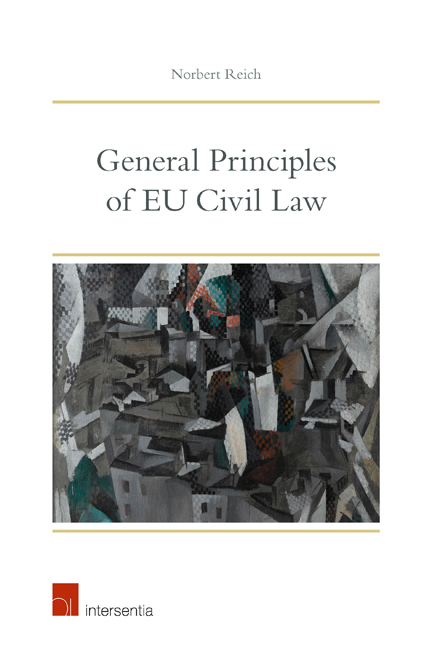Book contents
- Frontmatter
- Preface
- Contents
- Table of ECJ cases: alphabetical
- Table of ECJ cases: chronological
- Table of EU legislation
- List of abbreviations
- Introduction. What are General Principles of EU Civil Law?
- Chapter 1 The Principle of “Framed” Autonomy
- Chapter 2 The Principle of Protection of the Weaker Party
- Chapter 3 The Principle of Non-Discrimination
- Chapter 4 The Principle of Effectiveness
- Chapter 5 The Principle of Balancing
- Chapter 6 The Principle of Proportionality
- Chapter 7 An Emerging Principle of Good Faith and of a Prohibition of Abuse of Rights?
- Summary. Seven Theses and a Conclusion
- Index
Chapter 2 - The Principle of Protection of the Weaker Party
Published online by Cambridge University Press: 22 November 2017
- Frontmatter
- Preface
- Contents
- Table of ECJ cases: alphabetical
- Table of ECJ cases: chronological
- Table of EU legislation
- List of abbreviations
- Introduction. What are General Principles of EU Civil Law?
- Chapter 1 The Principle of “Framed” Autonomy
- Chapter 2 The Principle of Protection of the Weaker Party
- Chapter 3 The Principle of Non-Discrimination
- Chapter 4 The Principle of Effectiveness
- Chapter 5 The Principle of Balancing
- Chapter 6 The Principle of Proportionality
- Chapter 7 An Emerging Principle of Good Faith and of a Prohibition of Abuse of Rights?
- Summary. Seven Theses and a Conclusion
- Index
Summary
ELEMENTS OF PROTECTION OF THE WEAKER PARTY
EU civil law has emerged not so much as a body of rules with an objective of enabling citizens to use their autonomy for purposes, whether economic or not, to be determined by themselves, but rather as a body of provisions that tries to protect the weaker party and to combat discrimination (Chapter 3). To put it simply, at least three areas can be distinguished and have found their way into the Charter, frequently based on prior extensions of citizens’ rights by EU law amendments that will not be documented here, in particular in the field of social and consumer policy:
An important element of EU social policy has been the protection of persons in dependent employment situations by guaranteeing fair and just working conditions, Article 31 of the Charter, including the “right (of every worker) to limitation of maximum working hours, to daily and weekly rest periods and to an annual period of paid leave”. This conforms to Article 3(3) TEU on establishing a “social market economy”. Article 8 of the Community Charter of Fundamental Social Rights of 1989 which is referred to in Article 151(1) TFEU, has similar provisions; the ECJ has on several occasions made reference to it. A prominent example to be studied here is the Working Time Directive (WTD) 2003/88/EC of 4 November 2003 (recast), and its predecessor Directive 93/104/EC of 23 November 1993 concerning certain aspects of the organisation of working time. Their controversial interpretation by the ECJ will be taken as an example (2.3–2.4).
Another area where EU law has been active is the protection of consumers as typically weaker parties to contracts with business partners (B2C). This principle is now enshrined in Article 38 of the Charter, although in rather general terms. It was already contained in the old Article 129a EEC under the Maastricht Treaty of 1992, which became Article 153(2) EC of the Amsterdam Treaty and has now been transferred to Article 12 TFEU.
- Type
- Chapter
- Information
- General Principles of EU Civil Law , pp. 37 - 58Publisher: IntersentiaPrint publication year: 2013



